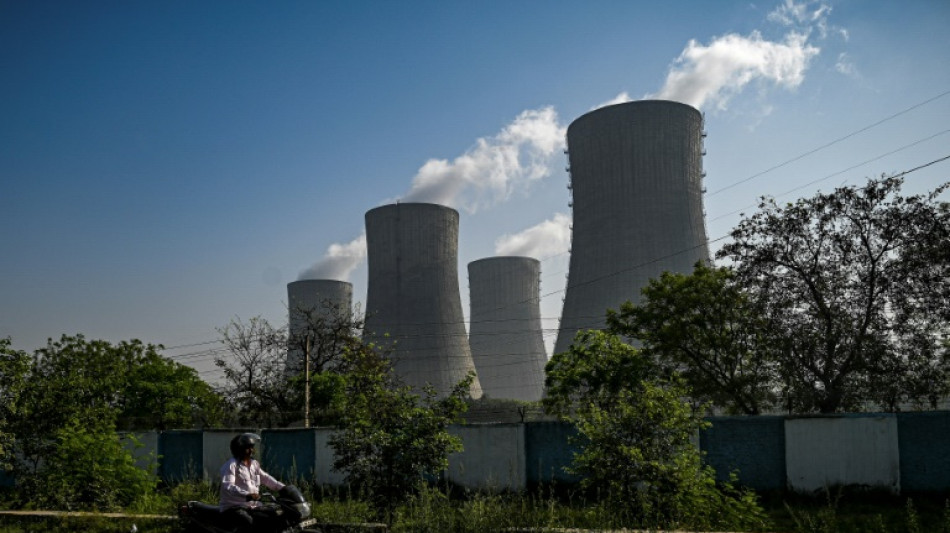
-
 Japan PM's tax giveaway roils markets and worries voters
Japan PM's tax giveaway roils markets and worries voters
-
Amid Ukraine war fallout, fearful Chechen women seek escape route

-
 Rybakina surges into Melbourne semis as Djokovic takes centre stage
Rybakina surges into Melbourne semis as Djokovic takes centre stage
-
Dollar struggles to recover from losses after Trump comments

-
 Greenland blues to Delhi red carpet: EU finds solace in India
Greenland blues to Delhi red carpet: EU finds solace in India
-
Will the EU ban social media for children in 2026?

-
 Netherlands faces 'test case' climate verdict over Caribbean island
Netherlands faces 'test case' climate verdict over Caribbean island
-
Rybakina stuns Swiatek to reach Australian Open semi-finals

-
 US ouster of Maduro nightmare scenario for Kim: N. Korean ex-diplomat
US ouster of Maduro nightmare scenario for Kim: N. Korean ex-diplomat
-
Svitolina credits mental health break for reaching Melbourne semis

-
 Japan's Olympic ice icons inspire new skating generation
Japan's Olympic ice icons inspire new skating generation
-
Safe nowhere: massacre at Mexico football field sows despair

-
 North Korea to soon unveil 'next-stage' nuclear plans, Kim says
North Korea to soon unveil 'next-stage' nuclear plans, Kim says
-
French ex-senator found guilty of drugging lawmaker

-
 US Fed set to pause rate cuts as it defies Trump pressure
US Fed set to pause rate cuts as it defies Trump pressure
-
Sleeping with one eye open: Venezuelans reel from US strikes

-
 Venezuela's acting president says US unfreezing sanctioned funds
Venezuela's acting president says US unfreezing sanctioned funds
-
KPop Demon Hunters star to open Women's Asian Cup

-
 Trump warns of 'bad things' if Republicans lose midterms
Trump warns of 'bad things' if Republicans lose midterms
-
Russian strikes in Ukraine kill 12, target passenger train

-
 With Maduro gone, Venezuelan opposition figure gets back to work
With Maduro gone, Venezuelan opposition figure gets back to work
-
Celebrities call for action against US immigration raids

-
 Rubio to warn Venezuela leader of Maduro's fate if defiant
Rubio to warn Venezuela leader of Maduro's fate if defiant
-
Denver QB Nix 'predisposed' to ankle injury says coach

-
 Lula, Macron push for stronger UN to face Trump 'Board of Peace'
Lula, Macron push for stronger UN to face Trump 'Board of Peace'
-
Prass stunner helps Hoffenheim go third, Leipzig held at Pauli

-
 Swiss Meillard wins final giant slalom before Olympics
Swiss Meillard wins final giant slalom before Olympics
-
CERN chief upbeat on funding for new particle collider

-
 Trump warns US to end support for Iraq if Maliki returns
Trump warns US to end support for Iraq if Maliki returns
-
Judge reopens sexual assault case against goth rocker Marilyn Manson

-
 South Korea's ex-first lady to learn verdict in corruption case
South Korea's ex-first lady to learn verdict in corruption case
-
Rosenior dismisses Chelsea exit for 'untouchable' Palmer

-
 Markram powers South Africa to win over West Indies
Markram powers South Africa to win over West Indies
-
Vladimir Padrino: Venezuela's military power broker

-
 Amazon closing Fresh and Go stores in Whole Foods push
Amazon closing Fresh and Go stores in Whole Foods push
-
Koepka nervous about game and fans in PGA Tour return

-
 Trump's Iowa trip on economy overshadowed by immigration row
Trump's Iowa trip on economy overshadowed by immigration row
-
Dortmund coach says Inter Milan are improved under Chivu

-
 US border chief in Minneapolis as Trump tries to calm crisis
US border chief in Minneapolis as Trump tries to calm crisis
-
What to know about America's colossal winter storm

-
 Iran warns against 'instability' after US strike group arrives
Iran warns against 'instability' after US strike group arrives
-
GM reports quarterly loss but boosts shareholder returns

-
 US banks fight crypto's push into Main Street
US banks fight crypto's push into Main Street
-
NFL Bills make offensive coordinator Brady new head coach

-
 TikTok settles hours before landmark social media addiction trial
TikTok settles hours before landmark social media addiction trial
-
Newcastle braced for 'ultimate test' against PSG after storm disruption

-
 Brook blitz ends Sri Lanka's unbeaten home run, England clinch series
Brook blitz ends Sri Lanka's unbeaten home run, England clinch series
-
LVMH 2025 net profit drops 13% to 10.9 bn euros

-
 Philip Glass pulls Kennedy Center premiere after Trump takeover
Philip Glass pulls Kennedy Center premiere after Trump takeover
-
Slot says Liverpool must fix 'very bad cocktail'


India under fresh scrutiny as UN panel calls for shunning coal
The mounds of jet-black coal shimmering under the afternoon sun at the Dadri power plant are a raw illustration of India's coal dependence -- a habit that despite increasing pressure, the country is finding hard to kick.
Coal is vital for providing electricity to India's 1.4 billion citizens, making up 70 percent of the country's energy needs.
That reliance is in the spotlight after a warning by UN experts this week that to ensure a "liveable future", countries must move to greener energy sources much faster to reduce emissions.
Coal-based plants like the sprawling Dadri facility are attempting to make themselves cleaner, but their efforts are mostly in their infancy, and pale in comparison to their overall emission rate.
Prime Minister Narendra Modi has set ambitious goals for renewable energy development, aiming to increase non-fossil energy capacity to over double the current coal capacity by 2030.
But Harjeet Singh of the Fossil Fuel Non-proliferation Treaty Initiative said that while the cost of renewable energy has come down by up to 90 percent in the last decade, India still requires hundreds of billions of dollars upfront to make the transition.
"That kind of international support in terms of investments or concessional loans or grants is not coming through," he said.
Experts say coal will remain the dominant fuel in India for a long time to come, with its energy needs over the next 20 years set to rise faster than any other country in the world.
- Crossroads -
The UN report, released Monday, said current policies are leading the planet towards catastrophic temperature rises and that the world was at a "crossroads".
If the world's current oil, gas and coal infrastructure operate for their designed lifetime -- without technology to capture and store carbon -- capping global warming at the target of 1.5 degrees Celsius will be impossible, it said.
India, which with China reportedly led opposition to a commitment to "phase out" coal at the COP26 summit last year, currently has about 211 gigawatts of operational coal capacity, according to the Central Electricity Authority, with another 55GW under various phases of construction.
None of India's power stations yet has the technology the UN report mentions as a mitigation option.
"Carbon-trapping technology is being used on an experimental basis at one of our plants," said B. Srinivasa Rao, chief general manager of the Dadri plant. "If it is successful it will be done at all the plants."
With six coal-fired units supplying megacity Delhi and elsewhere, the plant -- run by India's biggest power producer, the National Thermal Power Corporation (NTPC) -- is spread across some 3,000 acres (1,200 hectares) in the northern state of Uttar Pradesh.
It has taken some steps to reduce emissions, including burning pellets made from agricultural waste along with coal.
Like several other NTPC units, it has installed a solar thermal power plant with and output of 5 megawatts -- though the plant as a whole generates 2500 MW.
Rao said the plant has also achieved 100 percent recycling of fly ash, a main byproduct of burning coal, and implemented a zero liquid discharge system.
But locals living in the vicinity complained about coal dust spilling from trucks and affecting their health.
"It burns our eyes and hurts our lungs," said Rinku Rana, who runs a confectionery shop close by.
"But if the plant closes down we will be robbed of our livelihoods. So in a way it's a necessary evil that we have to live with," 29-year-old Rana said, wiping off a thick layer of ash-grey dust that had settled on biscuit and sweet packets at his shop.
- Climate equity -
Singh, the environmental campaigner, said India cannot continue to rely on fossil fuels, especially in view of severe air pollution.
At the same time, it needs cheap fuel to power its economy and help millions out of poverty.
Levies on coal are an important source of employment and government revenue, especially for states like Jharkhand and Odisha, among the poorest in the country.
Modi has said India will cut its emissions to net-zero only by 2070 -- missing a key goal of the COP26 summit for countries to commit to doing so by 2050.
The government argues that although the country is the world's third-largest emitter in total, its per capita emissions are far lower than the American average.
Singh said New Delhi was "well within its right" to talk about equity and climate justice.
"The current climate crisis is not because of India's industrialisation. It's because of the Western industrialisation that has happened over the last 150 years," he told AFP.
"Rich countries need to reduce their emissions far more earlier than what they have planned right now... and at the same time provide support to developing countries to move away from fossil fuels."
M.Ouellet--BTB




